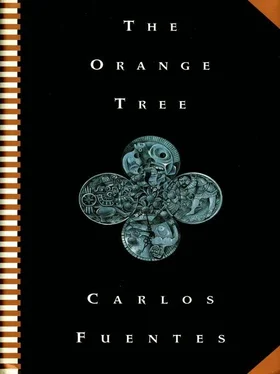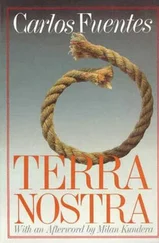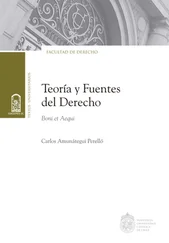MARTÍN 2
They accused him of such banal things. That he fancied himself a Don Juan. That he had Moctezuma’s treasure hidden somewhere. Utter crap. The real accusation was about seizing control of the land. That is, rebelling against the King. And to my eternal sorrow, that accusation included me. They dragged me out of the shadows. That night, the streets and entryways to the plaza were patrolled by men on horseback and foot soldiers. Everyone was in an uproar, and my brother deeply distressed. They put him in a very closely guarded room in the government house, completely surrounded by troops. But the room did have a window that faced the small square on the side of the cathedral under construction, where a platform was immediately built. He was disarmed, but they left him his elegant damask summer suit; they never laid a hand on him. Me the Indian, on the other hand, they threw onto a burro, stripped me, tied me down, and then tossed me into the same jail where they held my brother, just to see if my rancor would grow, to see if his pity would insult me.
On the way, tied naked to the burro, facedown, ass to the breeze, I had to put up with the jokes of every beggar in the city: Since when does one burro carry another, which one was the real burro? and the embarrassment of having my tiny little John Thomas compared with the burro’s huge phallus: Hey boy, don’t you long for that thing down there? or, Do you really think little things mean a lot? or, Are you going or coming, getting in or getting out, taking or giving, screwing or screaming? And there I am, facedown with the blood pounding in my temples and eyes, my testicles cold, emptied, and shrunken from fear.
I look at the city’s garbage and realize that I’ve always tried to look up — at the palaces being built, the balconies from which my brother and his friends used their blowguns filled with flowers, the niches of the saints (this stone city slowly sinking into the mud; the water went when the gods departed). Now my position forced me to look into the gutters flooded with garbage, the mud streets marked with animal tracks and cart wheel ruts, footprints in the dust, the dog prints indistinguishable from the human prints. I try to look up, although it pains my neck, at the cathedral under construction. A force that doesn’t touch me makes me bend my neck again. Every single thing I took for granted, I realize now, has been taken away from me. I look at Mexico’s soil, and I realize it changes ceaselessly, that the seasons change it, that sorrow changes it, that weeping changes it, footsteps, fainting, the disintegration of this porous, sunken ground that can’t decide between water and dust, between heaven and hell.
The burro stops and a small, misshapen woman wrapped in a black rebozo comes over to me, caresses my hand, slaps me. Then from her sunken, toothless mouth, from her dwarfish cheeks, from her wet tongue that can’t hold back her saliva decently, come the words I expected, the words that have hung over my life like that sword of Damocles that hangs over the heads of all Hernán Cortés’s descendants in their perennially postponed trials. The little misshapen woman violently raises my head by yanking on my hair and says to me what I expected to hear: “You’re a son of a bitch. You’re my brother. You’re the fucking son of la chingada. ”
MARTÍN 1
They’ve thrown my brother, the other Martín, into the same jail I’m in. How little imagination our father had. Always the same names. Martín, Leonor, Catalina, María, Amadorcico. What ever became of him? What ever became of the humpbacked María? I look toward the platform that’s been set up in the plaza, next to the scaffolding that will one day be that cathedral, and I tell my poor brother, the son of the Indian woman, to get up and come see the dawn, as we did one day from Chapultepec. But the other Martín’s ribs ache. They brought him in naked and beaten, filthy and stinking. No matter. It’s in situations like this when more than ever we’ve got to be good Christians, which I swear I am. “Look,” I told my brother, “it’s going to rain at daybreak; what a strange thing.” “Sometimes it does happen,” he painfully answers me. “The fact is”—he added—“that you never get up early.” I laughed. “But I do go to bed late. I would hear the raindrops; my hearing is very sharp.” “Well then, try to tell the difference between the rain and the drum that announces death,” said my ailing brother.
I leaned out the window. The little plaza had filled up with rabble, held back by horsemen. The Ávila brothers, Alonso and Gil, marched in between two ranks of armed men. My brother Alonso was wearing the finest stockings and a satin doublet, a damask robe lined with jaguar skin, a cap decorated with gold ornaments and feathers, and a gold chain around his neck. I could just make out a rosary made of tiny, white orangewood beads in his hand. A nun had sent it to him for days of affliction, and he, laughing, told me he’d never touch it. Next to the brothers were the Dominican friars. I took no notice of his brother Gil. He must have been coming into the city from some town when they arrested him because he was dressed plainly, in greenish cloth, and was wearing boots.
The Ávila brothers climbed onto the platform. First Gil lay down with his head stretched forward, but I could only keep my eyes on Alonso, my friend, my comrade, seeing him there, holding his cap in his hand, the rain soaking the hair he always took such pains to curl, he was so careful about his hairdo to make himself look handsome, seeing him and hearing the clumsy chopping of the executioner until he’d finally managed to cut off Gil’s head in bad style, amid the shouts and sobs of the people.
Alonso stared at his decapitated brother and heaved such a huge sigh that even in our prison I could hear it. Still staring, he went down on his knees, raised his white hand, and twisted his mustache, a habit of his, until the monk Domingo de Salazar, who later became bishop of the Philippines, helped him to die with dignity. He told Alonso it was not time to fix his mustache but to arrange his affairs with God. A voice intoned the Miserere; the monk said to the crowd, “Sirs, I commend these gentlemen, who say they are dying unjustly, to God.” Alonso made a sign to the monk, who bent down over the kneeling man and heard something in secret. They blindfolded Alonso. The executioner took three swings, as if he were cutting the head off a lamb, and I bit my hand, asking myself: Alonso, what things did we forget, did we forget to say to each other, Brother? Are we departing without doing something we should have done, be closer, talk to each other, love each other more? Were you unfaithful to our friendship in the hour of your death? Did you die without me, my adored Alonso? Are you condemning me to live without you? Condemning me to live desiring you, regretting everything that wasn’t?
MARTÍN 2
I know my city well. Something is changing it. I hear the haste. I see the ugliness. I don’t need anyone to tell me that the execution scaffold outside our window was put up overnight: something is changing the form, the face of Mexico City. It isn’t only the heads of the Ávila brothers that have been displayed on pikes in the great plaza. They’ve been placed such that my brother and I can’t avoid seeing them. Judge Muñoz Carrillo, always with his freshly washed face, does not have to visit us to say that these lodgings are only temporary, because he has ordered a jail to be built within two weeks so that all those who conspired against the King — and there are many — will be able to fit inside it. As soon as it’s ready, we’ll be brought there, to a jail, he tells us, where not even a bird will be able to fly over without his seeing it. He looks us up and down and warns us that those found guilty are sentenced at midnight so they have no time to send word to anyone, not even themselves. At dawn, the proper authority will simply appear at our door with two burros for us to ride and two crucifixes for us to carry in our hands. We will all hear the bells of the Town Hall. The executioner and the crier will accompany us to the place of execution.
Читать дальше












